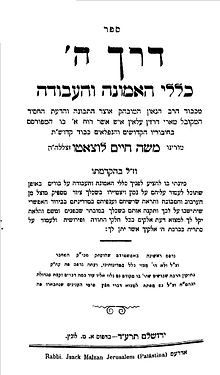Derech Hashem

Derech HaShem (The "Way of the Name") is a philosophical text written around 1736 by Rabbi Moshe Chaim Luzzatto. It is considered one of the quintessential handbooks of Jewish thought. It's of note that that would make the author around 29 or 30 when it was written.
The text covers a vast gamut of philosophical topics in the vast spectrum of classical Judaism's outlook on the world. These topics include the purpose of creation, the Creator, human responsibility, the spiritual realms, providence, Israel and the nations, astrology, the human soul, theurgy, prophecy, the study of Torah, prayer, and the function of mitzvah observance. All these are brought in a clear flowing structure that builds on previous topics.
Principles
[edit]The text systematizes the basic principles of Jewish belief regarding the existence of God, God's purpose in creation, and the logical consequence of other concepts in Judaism. The reader is led from thought to idea, from idea to a logical whole of the structure of Jewish belief.
One of its core assertions is that man was created for the purpose of earning closeness to the creator by struggling against evil inclinations.[1]
Presented from a Kabbalistic perspective, yet presupposing no prior knowledge and without the use of Kabbalistic terminology, this work provides a foundation for understanding the worldview and ideas found in the throughout Jewish works on these topics.
The book is organized into four main sections: the general basis of all existence, God's Divine Providence and interface with Creation, prophecy and the Human soul, and practical religious observance.
References
[edit]- ^ Benson, Bruce Ellis; Putt, B. Keith (2017). Evil, Fallenness, and Finitude. Cham, Switzerland: Palgrave Macmillan. p. 74. ISBN 9783319570860.
External links
[edit]- Hebrew Fulltext, daat.ac.il
- Lecture series (in English) elucidating the whole of Derech Hashem & Ma'amer HaIkkarim
- Online classes, Rabbi Yaakov Feldman, torah.org
- The Way of God, trans. Aryeh Kaplan, Feldheim 1997. ISBN 0-87306-769-X
- First step on the ladder of ascent, Rabbi Avraham Greenbaum
Text is available under the CC BY-SA 4.0 license; additional terms may apply.
Images, videos and audio are available under their respective licenses.
